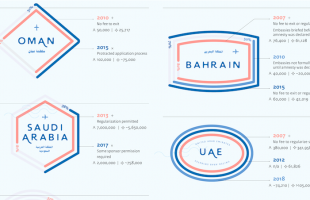On December 10, Saudi’s Ministry of Foreign Affairs (MFA) circulated an edict effectively banning any expatriate organization or association. The statement notified foreign representatives that the establishment of such organizations “violated the rules and objectives of diplomatic missions.” The statement further requested that officials “comply and prevent the creation of community organizations,” and “immediately cancel formation of organizations and their activities without permit from the Saudi Ministry of Foreign Affairs.”
Migrante-Middle East, one of the region’s premier migrant worker organizations, has implored the Filipino government to address Saudi's newest transgression on migrant rights. The Philippines immediately “suspended accreditation” of Migrante-Middle East and its 7 affiliate organizations, pending dialogue with Saudi officials. The circular’s effect on other expatriate organizations is difficult to gauge; the MFA seems to indicate that any non-national association is illegal, irrespective of its objectives.
The criminalization of expatriate associations contravenes the UN International Convention on the Protection of the Rights of All Migrant Workers and Members of their Families, which Saudi has neither ratified nor signed. This violation comes just one week prior to the convention's 22nd anniversary, which is acknowledged on December 18 as International Migrants Day. Saudi Arabia has also failed to ratify several ILO agreements that affirm the basic human and labor rights of migrant workers, which include the right to association.
These associations are essential for the promotion of migrant rights, as well as for the provision of services to migrants - services that neither Saudi nor sending nations are willing to fulfill. Organizations such as Migrante-Middle East have actively served Saudi’s Filipino community for years, begging the question - why is Saudi Arabia suddenly enforcing this purportedly “pre-existing” policy?




